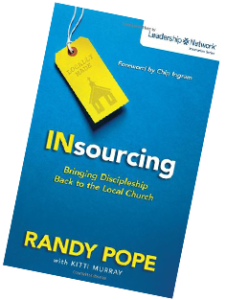Back to series


Recommended Reading:

It Takes a Church to Make a Disciple
Click here to open a Print - Friendly PDF
| I have great respect for golfers and tennis players, but my experience with athletics has centered on team sports. As part of a team, you understand that your success can be realized only as you fit into a larger whole. The skills and abilities of each team member must complement and even foster the skills of others so that together you achieve what no one member ever could alone. Further, your own training is enhanced by the encouragement of the team, as together you endure the physical and psychological rigors and discipline of working toward a common goal. In this light I contend that Christian discipleship must be seen as a team sport.
I ground this contention, first, in the fundamental mandate given by our Lord—the Great Commission of Matthew 28:19–20: “Therefore go and make disciples of all nations, baptizing them in the name of the Father and of the Son and of the Holy Spirit, and teaching them to obey everything I have commanded you.”1 A disciple of Jesus is one who follows Him in faith in a relationship that creates solidarity with the Master. This relationship is visibly expressed in baptism—that outward expression of our union with Christ in His death and resurrection (see Rom. 6:3–5). But our “vertical” union with Christ also has important “horizontal” implications. We each come alone to Christ, but in coming to Christ we do not remain alone; we are simultaneously constituted into the corporate body of believers. If in union with Christ, God becomes our Father, then all other believers similarly united to Christ become our brothers and sisters. And if, by virtue of our union with Christ, we are a part of His body, then we are fellow members of that body with every other person who is also in communion with Christ (see 1 Cor. 10:16-17; 12:27). The gospel cannot be separated from the church and becoming a disciple necessarily entails inclusion into this new social reality. Discipleship must include our loving fellowship with other believers simply because that is a primary goal of the discipleship process. The Great Commission not only calls for baptism, it also demands teaching believers to obey Jesus as Lord—the One in whom all authority in heaven and on earth has been given (Matt. 28:18). Jesus wants us to become like Him—to share His heart and life—and to become like Christ is to love His family: “By this everyone will know that you are my disciples, if you love one another” (John 13:35). You can’t be a disciple if you don’t love other disciples. But the loving community of the church is not only a goal of discipleship, it is also its means. The apostle Paul speaks of the This suggests that though one-on-one discipling can be extremely important and helpful (just as individual coaching can greatly enhance the performance of a team player), it is not enough, because no one person has all the gifts that are needed to enable us to grow to full maturity in Christ. The body needs ears and eyes and hands and feet if it is to function properly, and no one part of the body can claim that it doesn’t need the others (1 Cor. 12:21). The corporate character of discipleship is particularly emphasized in Paul’s instructions in Ephesians. He begins the second half of his letter, in which he focuses on living “a life worthy of the calling you have received” (4:1), by referring to the gifts Christ has given His church. Apostles, prophets, evangelists, and pastors and teachers are to build up the body of Christ “until we all reach unity in the faith and in the knowledge of the Son of God and become mature, attaining to the whole measure of the fullness of Christ” (4:13). Again, the body imagery is central. We are to “grow to become in every respect the mature body of him who is the head, that is, Christ. From him the whole body, joined and held together by every supporting ligament, grows and builds itself up in love, as each part does its work” (4:15–16). We are each a part of a living whole. The Christian life may be compared to a journey, but it’s not a solo race. It’s much more like a mountain-climbing expedition in which we are roped together. We lift each other up and catch one another when we fall, and success comes only when we all reach the summit. A mature disciple of Jesus must have a concern for the well-being of others as they travel together, for we need one another. C.S. Lewis said it well: [Christ] works on us in all sorts of ways . . . But above all, He works on us through each other. Men are mirrors, or “carriers” of Christ to other men . . . That is why the Church, the whole body of Christians showing Him to one another, is so important.2 There is more to Christ than any one of us can communicate to others. Timothy Lane and Paul Tripp explain: When we are in meaningful relationships with one another, we each bring a unique perspective and experience to our knowledge of Christ’s love. One person has been rescued from a menacing addition. Another has been brought through deep suffering. Still another has been sustained by God’s grace in a difficult marriage. The list goes on. When we gather to share our stories, we see a different aspect of the diamond that is the love of Christ.3 Christian discipleship can certainly be fostered in one-to-one relationships, but for maximum benefit it needs a larger community. The church family, like our biological family, is to provide that nurturing environment in which our shared values shape us and we experience loving discipline and instruction. Through the corporate practice of worship, including expositional preaching and participation in the Lord’s Supper, we experience something together that we could not alone. There is a special way in which it is “together with all the Lord’s holy people” that we are able to grasp how wide and long and high and deep is the love of Christ (Eph. 3:18).
A disciple can be described as “learner,” but the kind of learning in discipleship goes well beyond intellectual knowledge or truth. Disciples of Christ learn a way of life that flows from a personal knowledge of their Master, a form of learning more like an apprenticeship. The Christian life must be seen as well as taught (Phil. 4:9). Imitation is an integral part of growing in Christ (1 Cor. 4:16; Phil. 3:17; 1 Pet. 5:3). The church provides models to emulate, and through the years I have appreciated how the church has provided a variety of people who have modeled different strengths; one is an encouragement in evangelism, another in prayer, and still another in generosity. No one person can present the fullness of Christ. The church also provides opportunities to exercise one’s faith in relating to others. The biblical call to unity in the body of Christ, with humility and patience and forbearance, requires a growth in godliness that Lone Ranger–Christians would not know. We all need the structure of spiritual authority that a church provides, and the church provides the sphere in which to live out the gospel in relationship with other believers. I always get excited to see young believers get connected to those who are more mature in the faith; they get their first taste of “body life”—which is nothing less than Christ, by the Spirit, manifesting Himself in the lives of His people. They come alive! John Wesley was right: “There is nothing more unchristian than a solitary Christian.” Discipleship is a team sport! Engage in personal discipling ministry with all your heart, but always remember: It takes a church to make a disciple. |
|||
| Notes 1. Unless otherwise noted, Scripture quotations are taken from the New International Version. 2. C.S. Lewis, Mere Christianity (1952; repr., San Francisco: HarperSanFrancisco, 2001), 190. 3. Timothy S. Lane and Paul David Tripp, How People Change, 2nd ed. (Greensboro, NC: New Growth Press, 2008), 73. |
|||

William L. Kynes
Pastor, Senior Fellow for Pastoral Theology, CSLI Pastor William L. "Bill" Kynes is the Senior Fellow for Pastoral Theology at the C.S. Lewis Institute, and retired Senior Pastor of Cornerstone, an Evangelical Free Church, in Annandale, VA, where he served from 1986 - 2022. He was an undergraduate at the University of Florida with a major in philosophy. There he also played quarterback and was later inducted into the university’s Athletic Hall of Fame. He attended Oxford University as a Rhodes Scholar, receiving an MA in theology. He received an MDiv from Trinity Evangelical Divinity School, before returning to England for a PhD in New Testament from Cambridge University. From 1997-1999, he served as an adjunct professor in New Testament for the Trinity Evangelical Divinity School Washington, DC, Extension Program.
Recommended Reading:
Insourcing: Bringing Discipleship Back to the Local Church by Randy Pope with Kitti Murray (Leadership Network Innovation Series) Publisher: Zondervan (February 17, 2013)
 Too many of today’s pastors and leaders mistakenly think that thriving programs, lively worship services, and relevant preaching are adequate for developing people into the spiritual dynamos God desires. In many churches, the primary objective of the church—discipleship of people into mature followers of Jesus—has been “outsourced” to programs and large-scale efforts to train and teach. But is that happening? Are people growing in spiritual depth and missional determination?
Too many of today’s pastors and leaders mistakenly think that thriving programs, lively worship services, and relevant preaching are adequate for developing people into the spiritual dynamos God desires. In many churches, the primary objective of the church—discipleship of people into mature followers of Jesus—has been “outsourced” to programs and large-scale efforts to train and teach. But is that happening? Are people growing in spiritual depth and missional determination?
Twenty-five years ago, the leaders of Randy Pope’s rapidly growing church took serious stock of their own spiritual development and realized all of them had benefitted from a personal discipleship relationship that had helped them grow in their faith and discover where God was calling them to service. As a church, they decided to make personal discipleship their do-or-die aim: applying one person’s real life to another’s to accomplish something far bigger than that single life. Perimeter calls their approach “life-on-life missional discipleship” and Insourcing tells their story.
 COPYRIGHT: This publication is published by C.S. Lewis Institute; 8001 Braddock Road, Suite 301; Springfield, VA 22151. Portions of the publication may be reproduced for noncommercial, local church or ministry use without prior permission. Electronic copies of the PDF files may be duplicated and transmitted via e-mail for personal and church use. Articles may not be modified without prior written permission of the Institute. For questions, contact the Institute: 703.914.5602 or email us.
COPYRIGHT: This publication is published by C.S. Lewis Institute; 8001 Braddock Road, Suite 301; Springfield, VA 22151. Portions of the publication may be reproduced for noncommercial, local church or ministry use without prior permission. Electronic copies of the PDF files may be duplicated and transmitted via e-mail for personal and church use. Articles may not be modified without prior written permission of the Institute. For questions, contact the Institute: 703.914.5602 or email us.
-
Recent Podcasts
The Road Back – Trevor Lancon’s Story
by Trevor Lancon, Jana Harmon on November 15, 2024Deeply involved in his church’s youth group, Trevor...Read More
-
From Politics to Pampers
by Michelle Morgan Knott, Aimee Riegert on November 15, 2024
-
An Unexpected Change – David Westerhoff’s Story
by David Westerhoff on November 8, 2024
-
Recent Publications
Will You Be Ready?
by Thomas A. Tarrants on October 23, 2024Tom Tarrants gives insights on how we can...Read More
-
Should Christians Be Involved with Politics?
by Kerry A. Knott on October 1, 2024
-
Isn ’t Atheism Based on Scientific Fact Whereas Christianity is Based on “Faith”?
by Cameron McAllister on September 1, 2024
0
All Booked
0.00
All Booked
0.00
All Booked
23169
ADVENT CALENDAR: The Amazing Prophecies Fulfilled by the Birth of Jesus Christ
https://www.cslewisinstitute.org/?event=advent-calendar-the-amazing-prophecies-fulfilled-by-the-birth-of-jesus-christ&event_date=2024-11-28®=1
https://www.paypal.com/cgi-bin/webscr
2024-11-28

Next coming event
Days
Hours
Minutes
Seconds
ADVENT CALENDAR: The Amazing Prophecies Fulfilled by the Birth of Jesus Christ
On November 28, 2024 at 6:00 amSpeakers

William L. Kynes
Pastor, Senior Fellow for Pastoral Theology, CSLI
Team Members

William L. Kynes
Pastor, Senior Fellow for Pastoral Theology, CSLIPastor William L. "Bill" Kynes is the Senior Fellow for Pastoral Theology at the C.S. Lewis Institute, and retired Senior Pastor of Cornerstone, an Evangelical Free Church, in Annandale, VA, where he served from 1986 - 2022. He was an undergraduate at the University of Florida with a major in philosophy. There he also played quarterback and was later inducted into the university’s Athletic Hall of Fame. He attended Oxford University as a Rhodes Scholar, receiving an MA in theology. He received an MDiv from Trinity Evangelical Divinity School, before returning to England for a PhD in New Testament from Cambridge University. From 1997-1999, he served as an adjunct professor in New Testament for the Trinity Evangelical Divinity School Washington, DC, Extension Program.


 church as “a holy temple in the Lord” (Eph. 2:21). We are like “living stones” (1 Pet. 2:5), “being built together to become a dwelling in which God lives by his Spirit” (Eph. 2:22). The Spirit unites us as one body, and our social distinctions (and even the distinction between Jew and Gentile) no longer divide us (1 Cor. 12:13). But that same Spirit also distributes various gifts which that equip and empower believers to serve one another in the body of Christ and so build up one another in the faith. This is a wonderful body, a body full of variety, with people of all sorts, differing in their interests and skills and gifts, but each playing a vital part in the well-being of the whole.
church as “a holy temple in the Lord” (Eph. 2:21). We are like “living stones” (1 Pet. 2:5), “being built together to become a dwelling in which God lives by his Spirit” (Eph. 2:22). The Spirit unites us as one body, and our social distinctions (and even the distinction between Jew and Gentile) no longer divide us (1 Cor. 12:13). But that same Spirit also distributes various gifts which that equip and empower believers to serve one another in the body of Christ and so build up one another in the faith. This is a wonderful body, a body full of variety, with people of all sorts, differing in their interests and skills and gifts, but each playing a vital part in the well-being of the whole.


